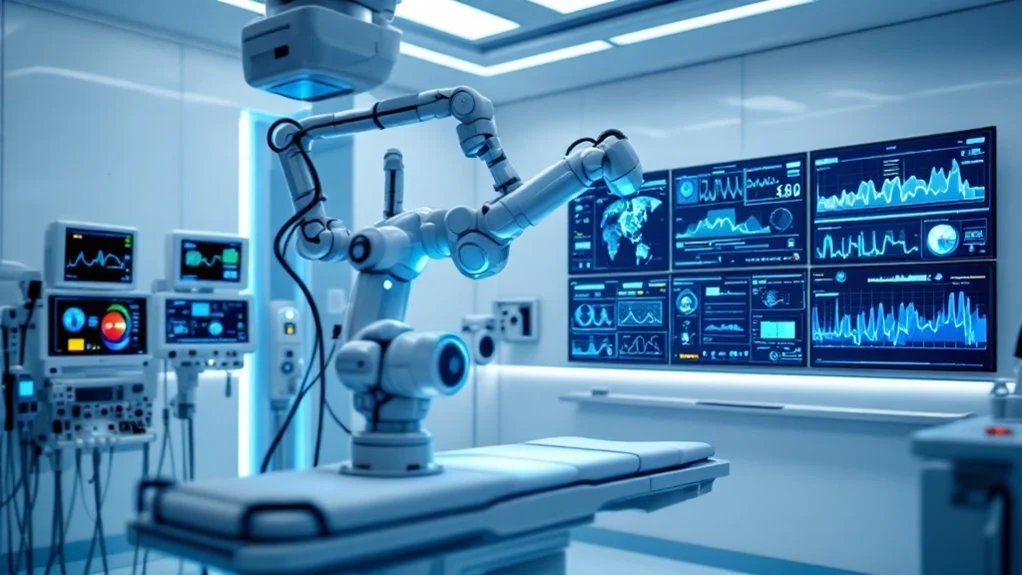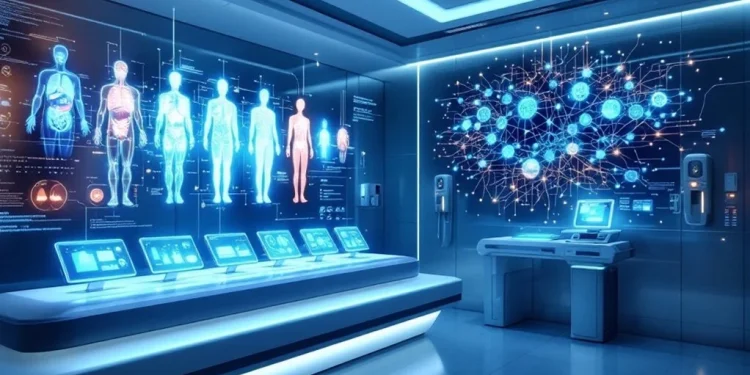Artificial Intelligence in healthcare uses advanced computer systems and algorithms to improve medical care and efficiency. It analyzes patient data, assists with disease diagnosis, and helps doctors make treatment decisions. Currently, 80% of hospitals use AI tools to enhance patient care and streamline workflows, while the global AI healthcare market has grown to $32.34 billion in 2024. The rapid expansion of AI technology continues to transform how healthcare providers deliver medical services.

As healthcare continues to evolve, artificial intelligence (AI) is transforming how medical professionals deliver patient care. The global AI healthcare market has shown remarkable growth, expanding by 233% between 2020 and 2023 to reach $22.4 billion. In 2024, this value increased to $32.34 billion, and experts predict it will reach $431.05 billion by 2032.
Healthcare organizations are rapidly adopting AI technologies to improve their services. Currently, 80% of hospitals use AI to enhance patient care and streamline their workflows. About 10% of U.S. healthcare professionals actively use AI in their practice, while nearly half plan to implement it in the future. AI helps doctors and nurses by analyzing medical data, interpreting lab tests, and providing data-driven recommendations. Disease diagnosis remains the leading AI application in European healthcare organizations. A significant 75% of leading healthcare companies are currently experimenting with generative AI.
AI adoption in healthcare is surging, with 80% of hospitals leveraging technology to enhance care delivery and optimize operations.
The growth of generative AI in healthcare has been particularly notable. Starting at $1.07 billion in 2022, this market segment grew to $1.95 billion by 2024. Projections suggest it will exceed $2 billion by 2025 and reach more than $10 billion by 2030. Healthcare organizations are primarily focusing on clinical decision support tools and predictive analytics, with about 30% prioritizing these applications.
Despite technological advances, public trust remains a significant challenge. About 60% of Americans feel uncomfortable with healthcare providers using AI for medical care. Additionally, 57% believe AI could worsen patient health record security, while only 22% think it would improve security. These concerns highlight the importance of addressing public perception as AI continues to integrate into healthcare systems.
Healthcare organizations are taking measured steps toward AI implementation, with 46% of U.S. healthcare organizations in the early stages of adopting generative AI. The technology’s capabilities include identifying patterns in medical data, assisting with diagnoses, and integrating with electronic health records for enhanced analysis. AI systems are becoming increasingly sophisticated, offering tools for various medical applications from symptom checking to treatment planning.
The future of AI in healthcare faces both opportunities and challenges. While the technology promises improved efficiency and patient care, concerns about data privacy and security remain significant considerations. As AI continues to develop, its role in healthcare is expected to expand, potentially revolutionizing how medical professionals diagnose, treat, and care for patients.
The technology’s growth and adoption rates suggest AI will become an increasingly integral part of healthcare delivery in the coming years.
Frequently Asked Questions
How Secure Is Patient Data When Using AI Healthcare Systems?
Patient data security in AI healthcare systems varies, with robust implementations offering enhanced protection through real-time monitoring and breach detection, while risks remain from third-party tools and unregulated AI applications.
Can AI Completely Replace Human Healthcare Professionals?
AI cannot completely replace human healthcare professionals due to limitations in complex decision-making, empathy, and patient preferences. It will transform roles rather than replace medical workers entirely.
What Happens if AI Makes a Medical Diagnosis Mistake?
Medical diagnosis mistakes by AI can lead to patient harm, legal liability issues, and damaged trust in healthcare systems. Continuous monitoring and human oversight help identify and correct these errors.
How Much Does Implementing Healthcare AI Technology Typically Cost?
Healthcare AI implementation costs range from $50,000 for small clinics to millions for hospital networks, with annual maintenance ranging $100,000-$1M, plus ongoing expenses for training, compliance, and upgrades.
Are AI Healthcare Systems Accessible in Rural or Remote Areas?
AI healthcare systems are increasingly reaching rural areas through mobile clinics, telemedicine, and remote monitoring. However, infrastructure limitations and connectivity issues still pose challenges in many remote locations.


